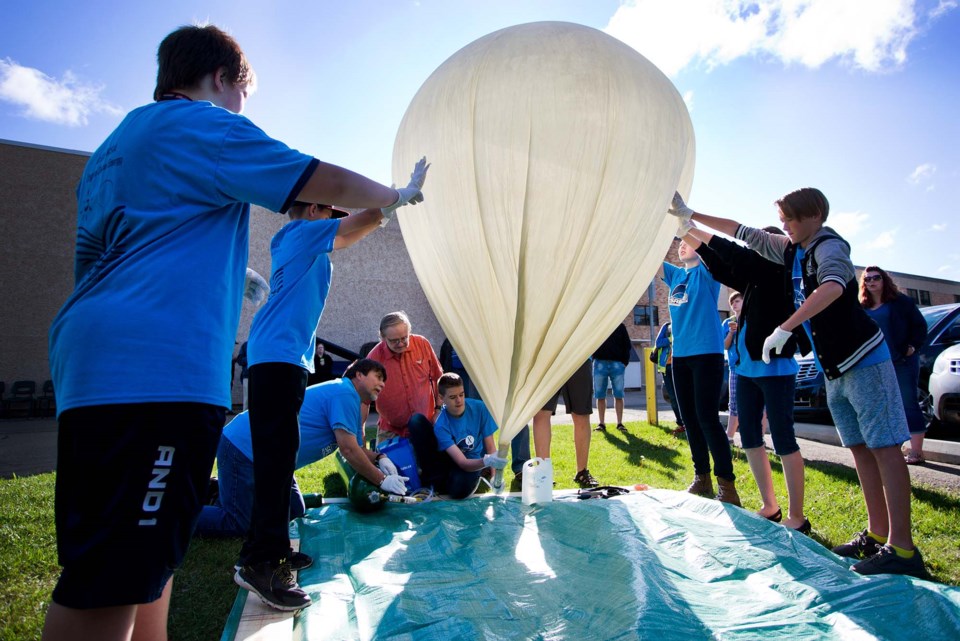A St. Albert space club has won a city grant to study air pollution with a big balloon.
St. Albert city council approved the 2022 Environmental Initiatives Grants Jan. 10 as part of their consent agenda. This annual grant program was meant to fund environmental sustainability projects by city residents.
This year’s grants saw 10 groups receive $33,200.
Students get green
One standout project was the St. Albert Catholic High School Space Club’s Air Quality Balloon Project, which won about $1,080 in support.
SACHS Space Club advisor Nelson Branco said one of the club’s members proposed to study air pollution in St. Albert using a weather balloon. The club assembled a payload containing sensors and cameras and hooked it to the balloon, which launched just prior to Christmas break in December 2022. (The club launched before getting its grant due to weather concerns.) The balloon rose some 29 km before it burst, with its payload landing near Vermillion.
Branco said the club was now analyzing data from the balloon and hoped to present the results to city council later this month. They hoped this project would improve the community’s awareness of air quality — a timely topic, given the smothering smog that swamped the St. Albert region on Jan. 11.
SACHS received another $2,010 grant for a school river education mentorship program. Teacher Neil Korotash said this program will help Biology 20 students run a workshop on water quality and aquatic ecosystems for elementary students on the banks of the Sturgeon River later this year.
Paul Kane teacher Andrew Meek received about $4,696 to buy greenhouse materials to start the school’s new Botanical Studies course.
Meek said this course would teach students about sustainable living and climate change by having them grow fruit and vegetables in the school’s greenhouse for the school’s culinary arts program. The greenhouse was an empty room right now, and needed some $8,000 in dirt, seeds, and other materials before it could operate.
“I think we need $3,000 or $4,000 in just lights,” he said.
Over at Bellerose Composite, Grade 11 student Cole Van Wyk got a $3,495 grant to continue reforestation efforts in Riverlot 56.
Van Wyk and other volunteers planted hundreds of trees in Riverlot 56 last June in partnership with the Riverlot 56 Natural Area Society. Many of those trees struggled to survive, as they were in a hot, exposed area which was soon overrun with weeds.
Van Wyk said this grant will help the team plant about 250 trees in a grid this June to test different forestry and weed management techniques. Specifically, the team hopes to see if planting saplings by a bigger “mother” tree can improve survival, and if more extensive mulch and/or and landscape fabric can suppress weeds.
Joseph M. Demko students got about $1,528 to learn about pollinators and build homes for bees, bats, and birds.
Garden projects
Many of this year’s grants went to garden-related projects.
The biggest grant went to the Star of the North Retreat Centre, which got $5,000 to continue work on a co-operative urban garden that grows Indigenous medicinal plants and fresh produce for those in need.
The St. Albert Botanic Park got about $4,004 to add a vast amount of compost to its plant beds.
The park’s gardeners have determined that the park’s soil needs restoration due to climate change and 30 years of heavy use, explained Richard Plain, a director with the Friends of the St. Albert Botanic Garden Society. This money would add one to three inches of compost to the park a year for five years to boost soil quality.
The Grandin Village Community Garden received about $3,789 to build a large on-site compost system to handle the condo complex’s organic waste, which would be used in a community garden. The Coal Mine Road Community Garden got $4,850 to build a rainwater capture system, while the Braeside Pop-Up Neighbourhood Garden got $2,750 to continue its operations.
The next round of Environmental Initiatives Grants rolls out this fall. Visit stalbert.ca/cosa/admin/grants/environmental for details.




